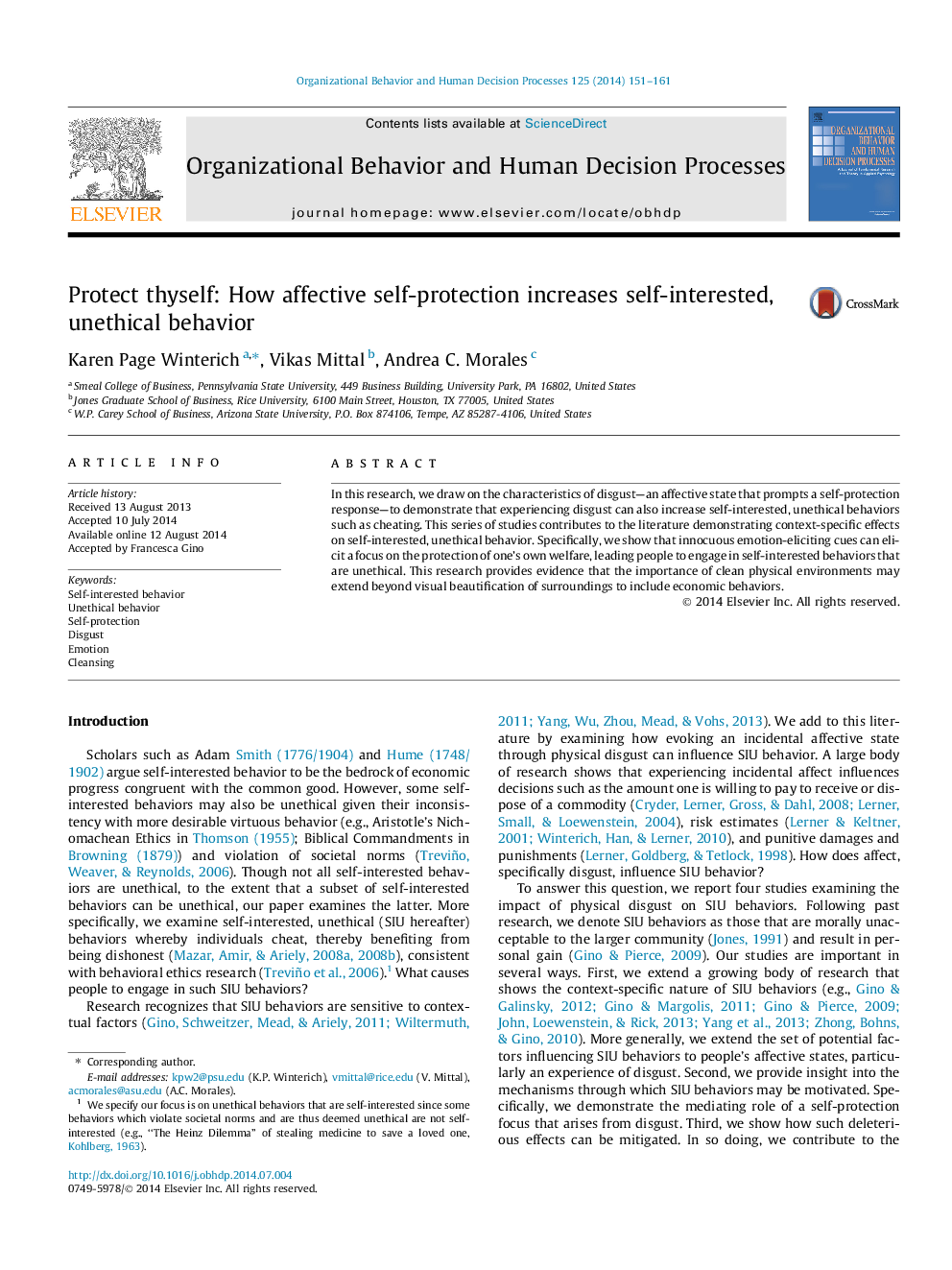Abstract
In this research, we draw on the characteristics of disgust—an affective state that prompts a self-protection response—to demonstrate that experiencing disgust can also increase self-interested, unethical behaviors such as cheating. This series of studies contributes to the literature demonstrating context-specific effects on self-interested, unethical behavior. Specifically, we show that innocuous emotion-eliciting cues can elicit a focus on the protection of one’s own welfare, leading people to engage in self-interested behaviors that are unethical. This research provides evidence that the importance of clean physical environments may extend beyond visual beautification of surroundings to include economic behaviors.
Introduction
Scholars such as Adam Smith (1776/1904) and Hume (1748/1902) argue self-interested behavior to be the bedrock of economic progress congruent with the common good. However, some self-interested behaviors may also be unethical given their inconsistency with more desirable virtuous behavior (e.g., Aristotle’s Nichomachean Ethics in Thomson (1955); Biblical Commandments in Browning (1879)) and violation of societal norms (Treviño, Weaver, & Reynolds, 2006). Though not all self-interested behaviors are unethical, to the extent that a subset of self-interested behaviors can be unethical, our paper examines the latter. More specifically, we examine self-interested, unethical (SIU hereafter) behaviors whereby individuals cheat, thereby benefiting from being dishonest (Mazar et al., 2008a and Mazar et al., 2008b), consistent with behavioral ethics research (Treviño et al., 2006).1 What causes people to engage in such SIU behaviors?
Research recognizes that SIU behaviors are sensitive to contextual factors (Gino et al., 2011, Wiltermuth, 2011 and Yang et al., 2013). We add to this literature by examining how evoking an incidental affective state through physical disgust can influence SIU behavior. A large body of research shows that experiencing incidental affect influences decisions such as the amount one is willing to pay to receive or dispose of a commodity (Cryder et al., 2008 and Lerner et al., 2004), risk estimates (Lerner and Keltner, 2001 and Winterich et al., 2010), and punitive damages and punishments (Lerner, Goldberg, & Tetlock, 1998). How does affect, specifically disgust, influence SIU behavior?
To answer this question, we report four studies examining the impact of physical disgust on SIU behaviors. Following past research, we denote SIU behaviors as those that are morally unacceptable to the larger community (Jones, 1991) and result in personal gain (Gino & Pierce, 2009). Our studies are important in several ways. First, we extend a growing body of research that shows the context-specific nature of SIU behaviors (e.g., Gino and Galinsky, 2012, Gino and Margolis, 2011, Gino and Pierce, 2009, John et al., 2013, Yang et al., 2013 and Zhong, Bohns, et al., 2010). More generally, we extend the set of potential factors influencing SIU behaviors to people’s affective states, particularly an experience of disgust. Second, we provide insight into the mechanisms through which SIU behaviors may be motivated. Specifically, we demonstrate the mediating role of a self-protection focus that arises from disgust. Third, we show how such deleterious effects can be mitigated. In so doing, we contribute to the recent interest in effects of cleansing on decision-making (Lee & Schwarz, 2011) by demonstrating how subtle activities such as evaluating cleansing products can minimize the potentially deleterious effect of experiencing disgust on SIU behaviors. Our findings show why dirty environments can have policy implications that go beyond visual beautification of physical contexts.


